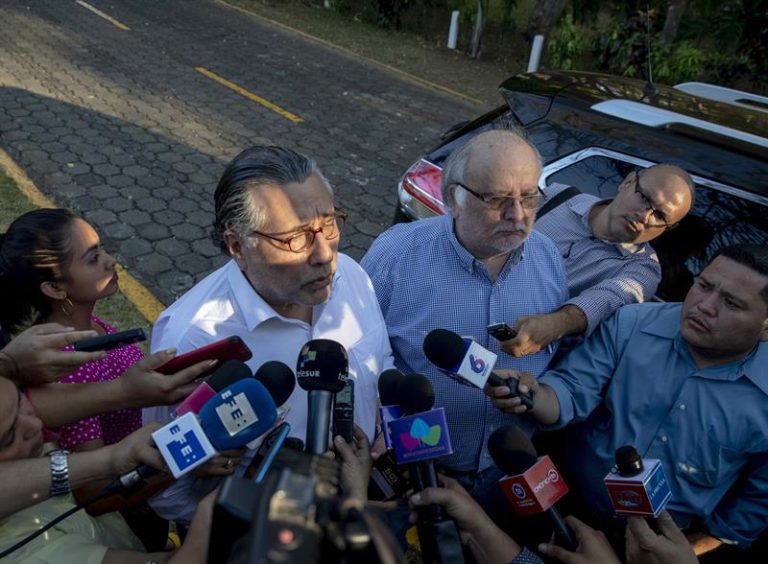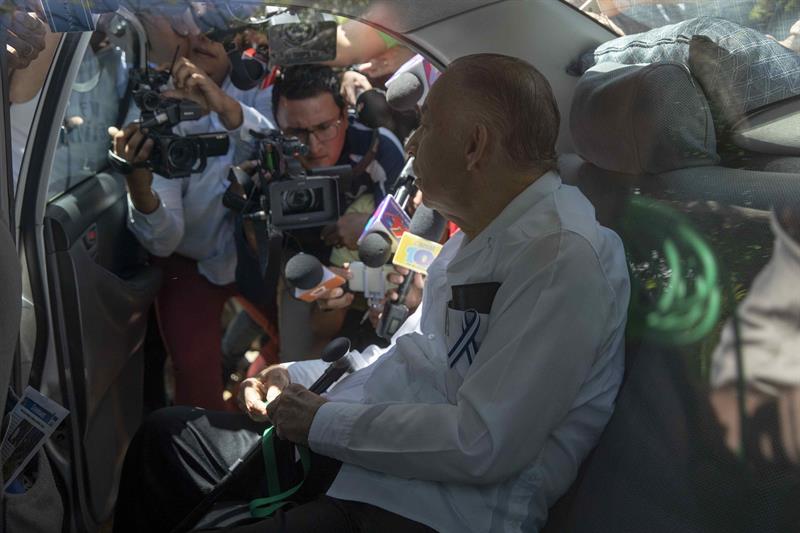16 de marzo 2019

Children of Exile: The Births “Sowing Hope” in the Camp of Nicaraguan Farmers

PUBLICIDAD 1M
PUBLICIDAD 4D
PUBLICIDAD 5D
“Process to liberate prisoners and the mechanism to ensure that purpose” were discussed, affirms the Civic Alliance, but gives no details.

“Process to liberate prisoners and the mechanism to ensure that purpose” were discussed
The Civic Alliance for Justice and Democracy demanded on Thursday that the Government of Daniel Ortega free “without any delay” the political prisoners, as a sign of the “good progress” of negotiations to overcome the crisis that the country lives. Meanwhile, more civil society groups, relatives of political prisoners and peasants continue to distance themselves from the negotiations with the dictatorship, just as the students did on Wednesday.
“The release of the political prisoners is decisive for making progress in the negotiation process with the Government,” said AmCham’s President and full delegate of the Civic Alliance, Mario Arana, after leaving the ninth round of negotiations on Thursday.
Arana explained that the Civic Alliance decided to return to the table, from which it had withdrawn last Sunday, to end “with the excuses of the Government to release the political prisoners.”
“That is why we decided to return to the table with a clear and definite purpose, which reflects the general feeling of Nicaraguan society,” he said.
He affirmed that during the resumption of the negotiations, this Thursday, they discussed with the Government’s negotiators the “processes to release the prisoners and the mechanisms to ensure that purpose.”
Arana clarified that the release of the detainees “would be a political decision of the Government and a sign that will make possible a comprehensive negotiation of all the points of the proposed agenda of the Civic Alliance,” regarding fair, free and transparent elections, and justice for the victims of the violent protests that began on April 18, 2018.
Politician and lawyer, Jose Pallais, another of the opposition negotiators, said that they expect this Friday “a first release of political prisoners, as a unilateral gesture of the Government.”
According to figures of the Committee for the Release of Political Prisoners, there are 767 anti-government protesters arrested.
The Government of Nicaragua recognizes 340 detainees for their participation in the “failed attempt at a coup d’état,” as the Executive characterizes the street protests that began on April of 2018, and considers them “terrorists,” “coupists,” and “common criminals.”
“There are differences on the lists,” Pallais acknowledged, adding that they are trying to consolidate the figures.
Asked about the number of detainees waiting to be released, Pallais said that they expect “an appreciable number, as the government statement mentions, and we will appreciate and assess that tomorrow.”
On the other hand, the Civic Alliance thanked the efforts of the General Secretariat of the Organization of American States (OAS) for its return to the negotiating table.
“It has played an important role in the informal processes to resume our presence at the negotiating table,” assured Arana, who announced that the OAS will continue to support this process.
The negotiations, which did not include the presence of the student representation that is part of the Civic Alliance, were resumed after the parties agreed to the “release of an appreciable number” imprisoned protesters, which was one of the demands of the opposition.
The parties reached that agreement after a joint meeting with the Apostolic Nuncio Waldemar Stanislaw Sommertag, and the special envoy of the OAS General Secretariat, Luis Angel Rosadilla, who participated in their capacity of witnesses and companions.
The Government and the Civic Alliance will discuss a timetable that will allow the gradual release of those detained for protesting against President Daniel Ortega, informed on Thursday the head of the opposition negotiators, Carlos Tunnermann.

El académico Carlos Tünnermann, jefe de la delegación de la Alianza Cívica en la mesa de negociación con el Gobierno de Daniel Ortega. // Foto: EFE
“This timetable is one of the points that we are going to discuss with the Government delegation,” Tunnermann, a former Nicaraguan Ambassador to the United States, told reporters.
“There is a specific commitment from the Government for tomorrow (Friday) that an appreciable number of prisoners will be out and that commitment is attested to by the representative of the OAS Secretary General (Rosadilla) and the Apostolic Nuncio,” he explained.
However, relatives of the political prisoners reject the decision to resume the negotiation, because they believe that the Government fails to fulfill guarantees such as releasing “political prisoners” or respecting human rights.
The decision taken “puts at risk the life and integrity of our sons, daughters, husbands, brothers and other relatives,” said these families, who are members of the Committee for the Release of Political Prisoners.
It is the second sector that rejects a return to negotiations without guarantees, after the University Coalition, which is composed of five student movements that oppose Ortega. This followed a statement on Wednesday, after the joint announcement of the Government and the Civic Alliance.
“Even if the Government releases a “number of political prisoners,” more Nicaraguans are detained every day for expressing their discontent against the regime,” the Committee complained, stressing that Ortega has no other interest with the prisoners but use them “as exchange currency to obtain concessions.”
They also warned that the return to negotiations without guarantees puts at risk “the civic resistance efforts that our relatives are making from prison.”
At risk are “national and international efforts being done at this moment to achieve democratic changes,” as well as “the collective consensus on the existence of a favorable environment prior to the resumption of the negotiation,” according to the Committee.
Archivado como:
PUBLICIDAD 3M
Confidencial es un diario digital nicaragüense, de formato multimedia, fundado por Carlos F. Chamorro en junio de 1996. Inició como un semanario impreso y hoy es un medio de referencia regional con información, análisis, entrevistas, perfiles, reportajes e investigaciones sobre Nicaragua, informando desde el exilio por la persecución política de la dictadura de Daniel Ortega y Rosario Murillo.
PUBLICIDAD 3D